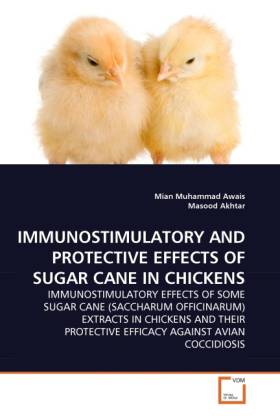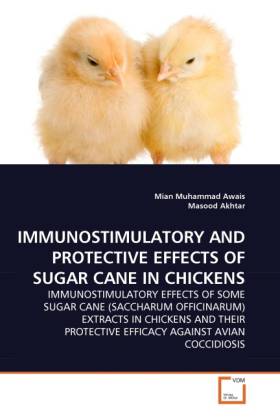
- Afhalen na 1 uur in een winkel met voorraad
- Gratis thuislevering in België vanaf € 30
- Ruim aanbod met 7 miljoen producten
- Afhalen na 1 uur in een winkel met voorraad
- Gratis thuislevering in België vanaf € 30
- Ruim aanbod met 7 miljoen producten
Zoeken
IMMUNOSTIMULATORY AND PROTECTIVE EFFECTS OF SUGAR CANE IN CHICKENS
IMMUNOSTIMULATORY EFFECTS OF SOME SUGAR CANE (SACCHARUM OFFICINARUM) EXTRACTS IN CHICKENS AND THEIR PROTECTIVE EFFICACY AGAINST AVIAN COCCIDIOSIS
Mian Muhammad Awais, Masood Akhtar
Paperback | Engels
€ 70,45
+ 140 punten
Omschrijving
The efficacy of immune system may be deregulated by various exogenous and endogenous factors which impair the immunohomeostasis of birds and their elimination is not always possible. As a result, birds become more prone to secondary disease conditions and show poor growth even if provided feed ad libitum and ultimately resulted in low feed conversion ratio and productivity. One of the practical methods to protect the immunobalance is by the use of pharmacological immunomodulators. Although vaccines and antibiotics have contributed a lot in controlling infectious diseases but frequent consumption of various chemicals and antibiotics has resulted in some problems such as development of antibiotic resistant strains and environmental pollution. In such circumstances, natural bioactive substances which have immunopotentiating effects in animals are promising candidates. In this regard, sugar cane has been reported as a potent immunomodulator. Keeping in view, the present study reports the immunostimulatory effects of oral administration of ethanolic and aqueous extracts of sugar cane (Saccharum officinarum) in chickens and their subsequent protective efficacy against Eimeria infection.
Specificaties
Betrokkenen
- Auteur(s):
- Uitgeverij:
Inhoud
- Aantal bladzijden:
- 96
- Taal:
- Engels
Eigenschappen
- Productcode (EAN):
- 9783639361780
- Verschijningsdatum:
- 2/06/2011
- Uitvoering:
- Paperback
- Afmetingen:
- 154 mm x 229 mm
- Gewicht:
- 166 g

Alleen bij Standaard Boekhandel
+ 140 punten op je klantenkaart van Standaard Boekhandel
Beoordelingen
We publiceren alleen reviews die voldoen aan de voorwaarden voor reviews. Bekijk onze voorwaarden voor reviews.







